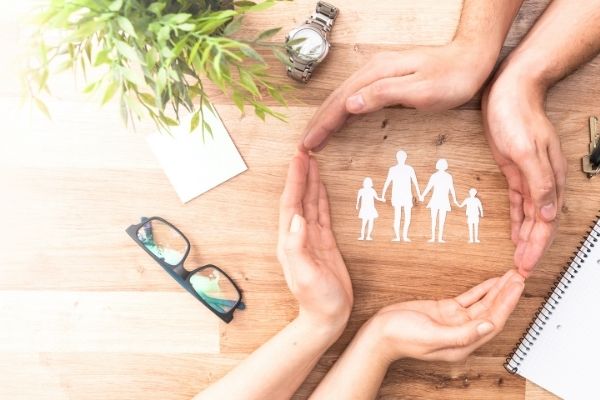Understanding Addiction Impact on Families
When a family member is experiencing a mental or substance use disorder, it can affect more than just the person in need of recovery. Evidence has shown that some people have a genetic predisposition for developing mental and substance use disorders and may be at greater risk based on environmental factors such as having grown up in a home affected by a family member’s mental health or history of substance use. Family members should be open to the options of support groups for families of addicts or family therapy and counseling, which can improve treatment effectiveness by supporting the whole family. [1]
How Families Can Support Loved Ones Through Addiction
Family members that are supportive and knowledgeable in the recovery world (especially with help from Al-Anon) will be extremely beneficial. For instance in offering practical help like taking you or a loved one to addiction treatment, therapy, or meetings. They can also encourage you to attend a 12-step program and even attend meetings with you. This type of help is essential in making you or a recovering loved one have a sense of importance and usefulness.

In a group of others in recovery, which will soon simply feel like a group of friends, one can get help on various life issues. For example, they might be able to help or suggest a new place to live, a career path, or anything else.
In conclusion, social support, especially from the family, is integral and will easily help boost morale and fortitude. Family should be careful not to enable you or your loved one. Enabling might seem like support. But, it makes the individual less motivated to stop abusing drugs, as their lifestyle and choices are being supported.
What to Do if Your Loved One Won’t Seek Treatment
Interventions can be successful in getting an addicted person to admit that they have a problem and to realize that they need help. To emphasize, it does not necessarily increase the efficacy of their treatment or their likelihood of success. However, social support and family support are significant components in recovery, and intervention can be an asset later on.
There are several factors to consider, such as the nature of the organizer’s relationship with the individual. While deciding whether an intervention is a suitable choice for your loved one is a significant decision on its own. Still, they must determine which type of intervention would be the most effective.

While interventions can be a catalyzing force in an addict getting sober, it is not guaranteed that an intervention will always be successful. A messed-up intervention can strain relationships and further alienate the addicted person from their loved ones when done incorrectly. This is one of the main risks of intervention and one of the biggest reasons why professional addiction intervention counselors should always be consulted before staging an intervention and present during.
Addiction intervention services can help defuse tensions and help to mediate the conversation. This can make interventions much more likely to be successful and result in the addicted person enrolling in rehab.
Working with a professional interventionist helps you or your loved one take the edge off of confronting an addicted individual. Not only will you have an expert to guide you through the process of planning the intervention event and coordinating an addiction treatment center; but you will also have a moderator to make sure the event itself goes smoothly; supporting your loved ones as well. Sometimes simply having that neutral person in the room is all you need to find common ground and save a life before it’s too late.
The Different Types Of Interventions
Just as addiction treatment is not a one-size-fits-all process, neither are interventions. Instead, there are multiple types and can vary on the setting, the number of people involved, and their relationship with the addicted person.
- Simple Intervention: A simple intervention is the least aggressive of all. More often than not, it is merely a conversation acknowledging the person’s addiction and asking them to seek treatment. Rather than involving many people, a simple intervention usually consists of one or possibly two individuals. Despite the simplicity of this approach, this method can be quite effective even without an addiction intervention counselor.
- Classic Intervention: Also known as the Johnson Model, like the name would suggest, this is the most mainstream type of intervention and the kind that comes to mind. It involves prior planning with all participants (except the addicted person), which usually includes close family members and close friends. The critical element of this intervention approach is that the confrontation is a surprise to the individual. Therefore, addiction intervention services can help tremendously in the intervention’s planning stage and maximize effectiveness.
- Crisis Intervention: Unlike the other types of interventions, this kind is usually impromptu and occurs when the addicted person has become a danger to themselves. The goal of this approach is to stabilize the situation and keep them safe. Convincing them to go to rehab may be discussed but is not the prime objective in this situation.

- Family System Intervention: This type of intervention involves other family members who suffer from addiction. This approach is based on the family systems theory and can be a great motivation to recover and undergo treatment. These family members are very involved in the addiction person’s recovery efforts beyond the intervention itself and participate in family counseling and the individual. This method is amazingly effective for repairing and strengthening family bonds.
Tips For Holding An Intervention
Your We Level Up addiction services counselor will walk you through the planning process to minimize the possibility of adverse outcomes. Here are a few recommendations on how to do an intervention.
- Guilt trips aren’t welcome here. The purpose is not to shame an addict but to open their eyes to how they have harmed themselves and others.
- Do not yell. This can make them feel attacked and put them on the defensive.
- Be mindful of the time and setting. Make this confrontation as non-stressful as possible and avoid doing it when their emotions are already volatile (like after a breakup or getting fired) or somewhere that they will be distracted or intimidated.
- Be as specific as possible. Each participant is recommended to an itemized list of short grievances and the point.
- Write down speaking points in advance. Doing so when your calmness can help prevent things from being said harshly in the heat of the moment.
Supporting a Loved One in Recovery
A family that is conscious of its role in helping the loved one to recover is likely to offer both the physical shelter and the psychological safety one needs during the early stages of recovery. Whether it is a nuclear family or a newfound family in recovery, family is always there! This setting makes recovery simple, insofar as us simply letting others guide and direct our decisions and behaviors in early recovery. This care and protection reduce the stress level often seen in early recovery and enables us to focus more strongly on their recovery, and what really matters, often helping us get back on track when we slide off.
Treatment and Recovery Services
We Level Up TX treatment center is committed to supporting families of loved ones, undergoing rehab treatment. Our caring and attentive specialists work hard to reconnect the broken relationships between families and their recovering loved ones. They set out to find mutual areas to help mend the client and family dynamics and underlying relationships. [3]
We know that addiction and corresponding mental health illnesses touch virtually all aspects of client relationships. Negatively impacting and even destroying family relationships, extending to erosion of work and social life relationships. Because client families play such an important and critical role in client recovery, we offer treatment services that deal with enabling behaviors. And touch on earlier traumas plus include family involvement opportunities/updates/discussions along with family dynamics therapies within our treatment modalities.

Family therapy is usually provided by a psychologist, clinical social worker, or licensed therapist. Patients need to trust their therapist to be able to open up and talk about their issues. Parents, whether married or divorced, spouses, grandparents, and even siblings may visit or attend the sessions or scheduled family visitation timeframe by invitation along with client and therapist approvals.
Support Groups for Families of Addicts Near Me
Most of us who had been suffering from addiction or alcoholism have been cast out by our family, work, and even at times by society. This lifestyle has a knack for pushing those that matter to us most away. It is because we cannot help but simply be selfish about our own needs revolving around the drug or drink.
Our support groups for families of addicts here at We Level Up TX will also ensure your recovery along with your family. This is to assure your sobriety and mental health are going in the right direction.
Make this your opportunity to reclaim your life. Call today to speak with one of our treatment specialists. Our specialists understand interventions. Many of them know what you are going through personally and can answer any of your questions. We Level Up rehab center’s free hotline is open 24/7 for no-hassle calls about interventions and more.
Your call is private and confidential and there is never any obligation.
Sources:
[1-2] https://www.samhsa.gov/families – Substance Abuse and Mental Health Service Administration Support groups for families of addicts